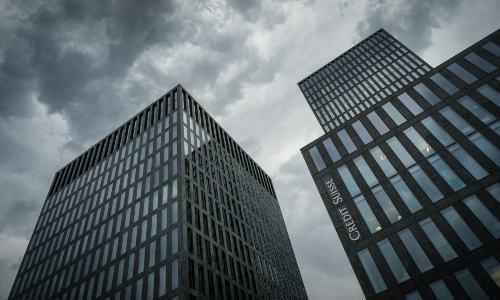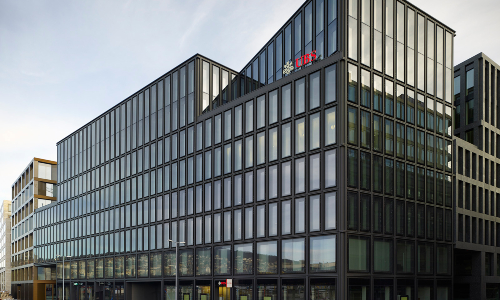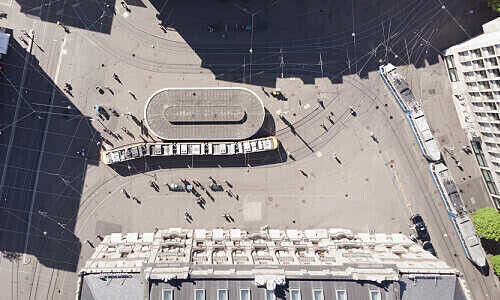Demand for office space from UBS and Credit Suisse in Zurich was already in flux before the forced takeover. Are there signs of a future glut or even a price shock?
When UBS CEO Sergio Ermotti was asked at a media conference in August about the future of Credit Suisse's headquarters on Paradeplatz, he couldn't help a slightly tired smile. «We haven't had time to think about the buildings yet,» came his terse reply.
Nevertheless, the question carries weight because the new UBS has become the country's largest private real estate owner with its ownership of Credit Suisse joint investment vehicles. The demand for office space is already fluid, with long-term consequences for the Zurich market.
Moving Out and Building Anew
Long before the emergency takeover, both banks made fundamental decisions regarding their property management in Zurich. In the case of Credit Suisse, it primarily concerned the termination of the office towers on Hagenholzstrasse, which it had used for 15 years.
The move-out and abandonment of around 30,000 square meters of office space are planned for mid-2024, with approximately 1,000 employees relocated to other sites, particularly the Uetlihof complex.

Credit Suisse building on Hagenholzstrasse (Image: Shutterstock)
UBS plans to go even further. In Zurich's District 9, it wants to erect an office building around 110 meters high by 2029, in which about 2,700 people will work. The «Areal VZA 1» project replaces a building from the 1970s on Max-Hoegger-Strasse.
With the new high-rise, UBS would create a unique focal point alongside its headquarters on Bahnhofstrasse and its administration building on Zurich's Europaallee.

«Areal VZA 1» (Image: UBS)
Cards Reshuffled
With the job cuts associated with the integration of Credit Suisse, the deck of Zurich office properties is being reshuffled, although it will be a long-term process. According to specialists such as Daniel Stocker, there should be no significant market upheavals in Zurich's office space supply.
The head of research at real estate consultant Jones Lang LaSalle tells finews.com that he doesn't expect the Credit Suisse integration to «significantly» impact the Zurich real estate market. He expects it to be a longer process as demand for space in central locations remains high in Zurich.
In any case, the bank's property management division will likely be busy. Group Corporate Services is responsible for the global real estate park and Switzerland, but information on the future footprint in Zurich cannot be given now, it said when asked.
Robust Inventory
At the beginning of the deliberations at UBS, there will probably be a thorough evaluation of the real estate portfolio and a review of the existing contracts and conditions. Decisions will only be made once the requirements planning has been completed and it's clear which areas of the merged bank will cooperate regarding space.
This may also involve strategic relocations regarding IT facilities or back-office functions.
For now, it's not expected that UBS will make definitive decisions for all properties or future space requirements, Stocker added.
Higher Job Cuts
As a result of the integration, UBS expects to cut 3,000 jobs in Switzerland, of which about 1,000 are likely to be in Zurich, in a process expected to start at the end of next year.
However, it should be noted that the redundancies represent only a fraction of the job cuts at the megabank. In addition, there will be voluntary departures, early retirements, and terminations of temporary employees and external specialists. All of this points to less office space. But in addition to the ongoing restructuring, other aspects play a role in space requirements planning, such as the issue of home offices and flexible working.
Is Europaallee Emptying?
Assuming an average space requirement of 15 square meters per employee, 1,000 fewer workstations correspond to around half of UBS's office space in Europaallee.
The building, inaugurated in 2013, provides around 2,000 workplaces over approximately 31,000 square meters.

UBS Building on Europaallee (Image: Architect Studio Max Dudler)
This continues the trend of recent years of concentrating on fewer locations to save costs. UBS reduced the number of its Zurich locations from over 50 to around 20 since 2010. At Credit Suisse, the number fell from about 60 to 15.
Central Locations in Demand
Stocker currently sees high demand for A-locations in urban centers in Switzerland. He said that demand for office and commercial space in the central locations of the major economic centers remains intact.
Compared with countries such as Germany, France, and the United Kingdom, vacancy rates for offices in Switzerland are low. According to JLL's figures, the rates in Geneva (6.1 percent), Basel (5.3 percent), Zurich (4.6 percent), and Zug (3.4 percent) are lower than in London (9.5 percent), Frankfurt (8.5 percent) or Paris (8.0 percent).




































